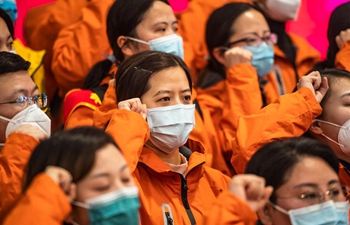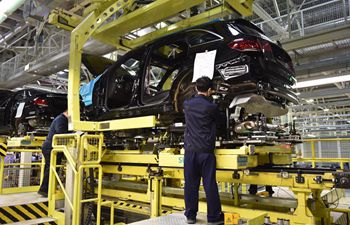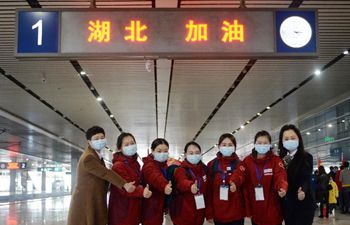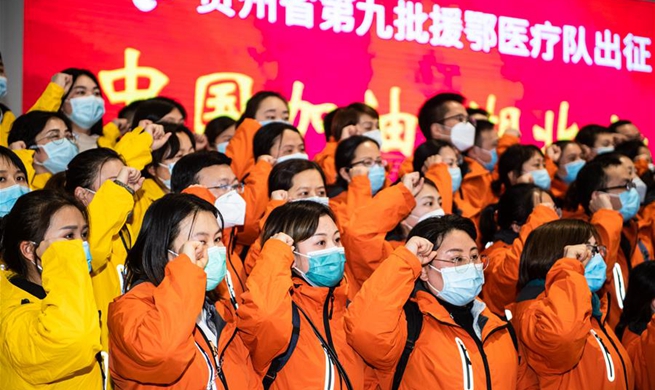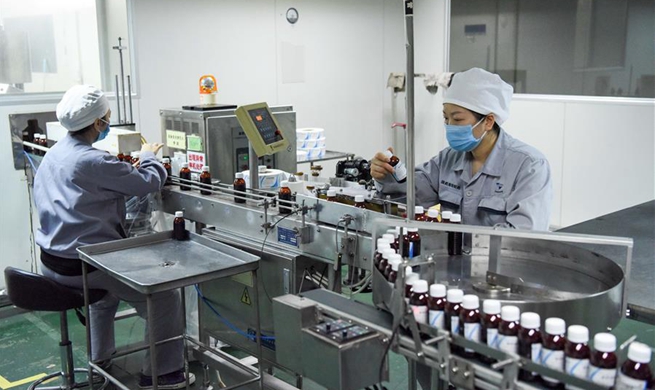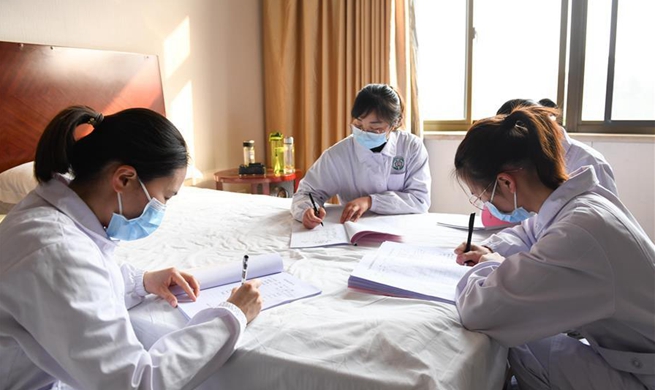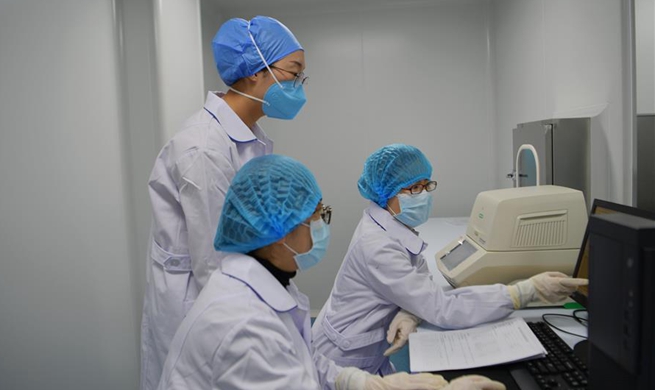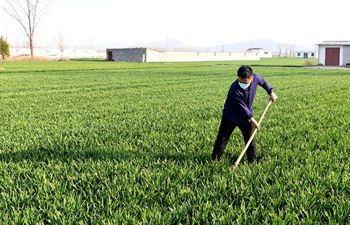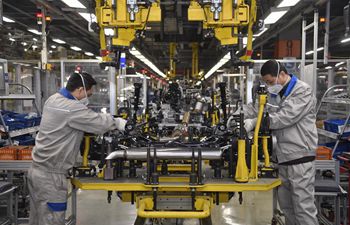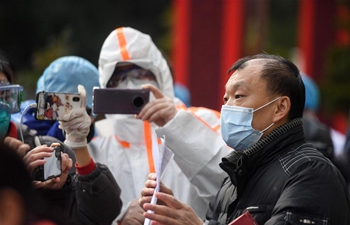HANGZHOU, Feb. 22 (Xinhua) -- Wang Lifeng (pseudonym) could not feel luckier when he looked back at some decisive options he made seven weeks ago.
"What I did has indeed saved my whole family," he said from his home in Ruyang Village in Rui'an, a coastal city under the jurisdiction of Wenzhou, east China's Zhejiang Province.
Wang, 51, sells glasses in Wuhan. He has been there doing the business for 15 years. His youngest child was born in the city.
He is one of more than 100 merchants who run a business on the second floor of the Wuhan Huanan Seafood Wholesale Market.
Wang remembers the first day he wore mask was Dec. 31, after he read messages circulated on the WeChat claiming that some SARS-like cases have occurred in Wuhan.
"After all, having experienced SARS in 2003, I was vigilant and began to think about what to do," he said.
The rumor was refuted, however, the next day. "It was not SARS. Experts said there was no transmission for the time being. How could ordinary people like us know more than that? So we believe it may be just general pneumonia," Wang said.
The first cases of novel coronavirus infections were reported in December in Wuhan, the capital city of central China's Hubei Province. These cases were mostly related to the seafood market in Wuhan, the epicenter of the outbreak.
On Dec. 31, Hubei announced cases of pneumonia with unknown causes to the public for the first time.
"We were alert early and began to wear masks to protect us," he said. "I heard that several Wenzhou merchants were slightly infected in the market and went to hospital in time for treatment. Now they have all recovered."
Wang recalled that when the seafood market was closed on New Year's Day, businesses upstairs were still as normal.
"Some went downstairs to see how they cleaned up and inquire about the epidemic," he said, adding that many cared more whether the market would be reopened before the Spring Festival, which fell on Jan. 25 this year.
Wang felt something must be wrong when he and other merchants received a notice that the second floor of the market would be closed one week ahead of schedule. The actual closure date was later updated as Jan. 11, about 10 days earlier than the normal schedule.
"People in the market were saying that several merchants have been infected and hospitalized. As more and more gossips poured in, the fear began increasing," he said.
There are three hospitals near the seafood market. Wang learned from some doctor friends that people were infected every day. "It was not the same as the official announcement," he said.
He closed his own store on Jan. 10, one day ahead of the required deadline.
"I became more cautious than others since I'm from a sensitive location," Wang said.
Apart from accompanying his son to school, Wang and his wife stayed at home most time of the day.
His son was the only one in his class who wore a mask.
"Why should I wear a mask? No one does so. That makes me look weird," complained the boy.
"Just wear your mask. Don't mind what others think," Wang replied.
On their way to school, Wang noticed that unlike the cautious people living in the compounds near the seafood market, most people had no sense of what was happening.
"People seldom wore a mask in the metro, on the buses, in the streets, or in the supermarkets," he recalled.
Before going to bed on Jan. 19, Wang checked the tickets for the flight to Wenzhou and found they were available right the next day.
"Let's go. I will call my son's teacher to ask for a leave," Wang told his wife.
A relative of Wang drove the masked three to catch the flight. To Wang's surprise again, few people he met at the airport wore a mask.
"It seemed that they were quite relaxed about the epidemic," he said.
After boarding, a flight attendant told Wang: "You've done a really good job of protection. I wish I could wear a mask."
Wang said he could read worry from her eyes. But wearing a mask in public is not a private decision for service personnel like her.
"At that time, many passengers and airport staff did not wear masks. It was no different from usual. Obviously, the epidemic situation has not attracted enough attention," he said.
Fortunately, Wang and his family were among those who first wore a mask. And they deliberately kept a distance from others in public places.
The Wang's went straight home once they landed in Wenzhou. Wang canceled all planned housewarming parties, visits, banquets and get-togethers with relatives and friends, and declined theirs.
"I'm quite conscientious about being back from the Wuhan seafood market, though others might not have an idea about what this may mean," Wang said.
Also being vigilant was the local government. Wang recalled that the next day Rui'an government asked local people not to contact those with a travel history in Wuhan.
"In contrast, Zhejiang has reacted promptly by taking prevention and control measures early. Soon, weddings were not allowed in my village. And most banquets were canceled," Wang said.
On Jan. 23, two days ahead of the Lunar New Year, China locked down the megacity of Wuhan to curb the spread of the novel coronavirus.
The culture hall in Wang's village has been closed since the first day of the Spring Festival. It used to be the venue for the whole village to attend festive activities. Village cadres visited each household to tell them about dos and don'ts.
Then all the villages began to block roads. "Although it brings inconvenience to our life, we can't help it during the emergency period," Wang said.
He and his family were at home in isolation. Sometimes he went downstairs for a walk after 9:00 o'clock at night when there were few people outside.
"There are more than 30 people in our village who came back from Wuhan. Fortunately, we all have not been infected," he said.
"Several people who also sell glasses in the seafood market were not able to return before the Spring Festival. And some others could not make it since they got mild infections," he said.
Wang's main concern at present is his son's schooling. As for his business, there was little he could do.
"I'll just take it as a long vacation since I've been working for most of my life," he said.
"In Wuhan, the patients and the frontline medics are those who suffer most," he said. "I watch the news every day. It makes me very sad."
"We all feel like that this is a tough year for business. I hope the epidemic situation will be brought under control as soon as possible and the market will slowly return to normal," Wang said.




